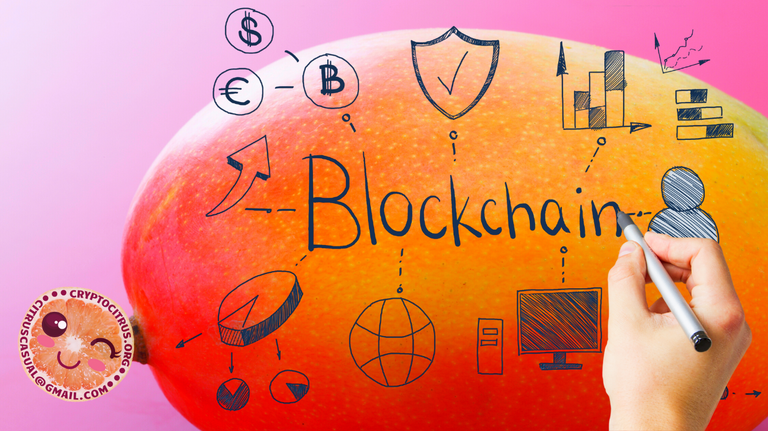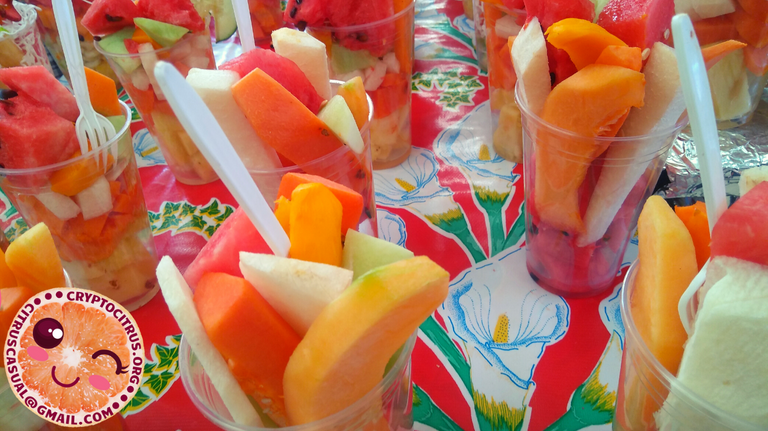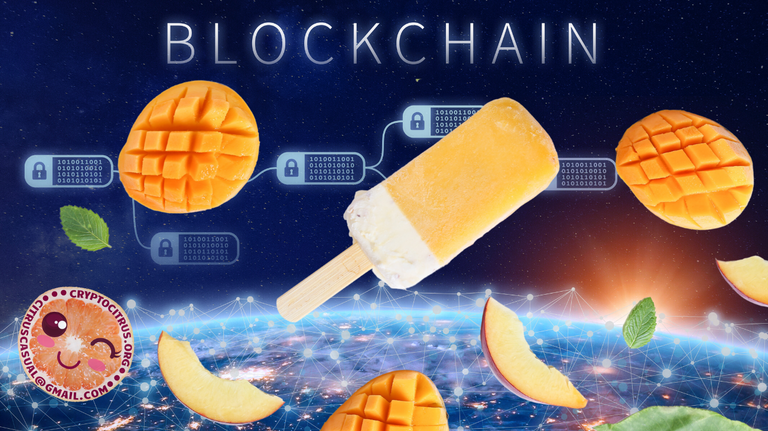
Where I live there exists a remarkably flavored fruit that is sourly-sweet, loudly yellow, and tropically fruity. It grows here in Mexico.
The Mango, a tangy fruit with a fresh and sweet aroma that causes your tastebuds to jump up with glee. Yay! Tastebud Party! Lol.
Mango season in Mexico. You want to see what it looks like?

Look at that! 🤤🤤 And a little goes a long way too.
It's funny how Mangos are used for decorating everything, from cakes, to walls and t-shirts. Here in Mexico there are also fruit cups you can buy from street vendors usually topped with chili.

Reading Up A little On Our Food Source Distribution
The other day I came across this article that makes a good point about our food distribution and blockchain technology.
In previous years, I've seen news articles discussing disastrous foodborne illnesses caused by farming products. Like the spinach and peanut butter disasters in the U.S.
Both separate events.
The globalized commerce we've created has helped expand our foodchain resources. Thanks to technological advancements we've been pushed into a little dilema. Blind foodchain consumption.
Why It's A Good Idea To Know Where Your Food Comes From
Food producing is an industry. There is money to be made in agriculture and this sometimes means there might be room for abuse.
Humans are not perfect and some are tempted to take short cuts to increase a cent or two by reducing quality control.
Other times farmers are not fully aware that certain malpractices could potentially harm the health of a big portion of their consumers. You and me.
Because of the industrialization boom we've really lost track of where our food source originates from.
What I mean is that, humanity not only used to buy locally but we even grew our own food just a couple of generations ago. I still remember my parent's stories on how they had to help their parents with the crops in order to even have food on the table.
With globalization, we now have growing food sources with a paralleled lack of accountability.

How Are We Catching Up With Emerging Technologies?
Well, Wal-Mart implemented blockchain technology for tracing back the origin of their produce. A blockchain was specifically employed to record the shipping path of mangoes from Mexico to Wal-Mart store fronts.
"For instance, Walmart has piloted the technology to track sliced Mexican mangos from orchards to its stores. Over 30 days, tens of thousands of mangos were traced on their journey from 16 Mexican farms, two packing houses, three brokers, two import warehouses, and one processing facility before eventually arriving on the store shelf.
Using traditional manual, paper-based methods, it took almost a week to trace a specific mango back to the farm. With blockchain, that time was cut to 2.2 seconds!
The technology promises to not only simplify and automate complex supply-chain records. It offers the potential to investigate food-borne illnesses in seconds, while ensuring the quality and authenticity of produce. Next fall, Walmart plans to launch blockchain to track every bag of spinach and head of lettuce placed on its shelves."
-Kathleen M. Hamm, Speech Source
This is remarkable! Now just think of all the possibilities. A QR code on every product that sends you (in 2.2 seconds) to a page showcasing all the places this product has come in contact with.
I especially like the idea of being able to trace back an outbreak of food borne illnesses.
More transparency from big Corps would allow us to responsibly vote with our purchases.
Some Additional Posibilities.
What we put into our bodies has a big impact on our health.
Cryptocurrencies return the power of money to the people.
However decentralized Crypto technology can be employed to improve transparency and real-time abuse detection.
With this blockchain tracking tech, food suppliers could potentially be incentivized with a specialized token that rewards them for doing the right thing.
The tracking would also hopefully prevent food forgeries that are potentially harmful.
Eventually, if we get 20% of the top food producers to join blockchain technology, then 80% of the smaller producers would follow in their footsteps.
Just like how Wal-Mart's already doing it, I can also picture organic farmers being early adopters of blockchain transparency.

Hi, there! What do you think? Comment below!
Thanks for reading my crypto implementation brainstorms. There is so much potential and we're still early into mass adoption.
That's why I enjoy doing my part in making noise about it, in the hopes of reaching new people!
Join me by subscribing!